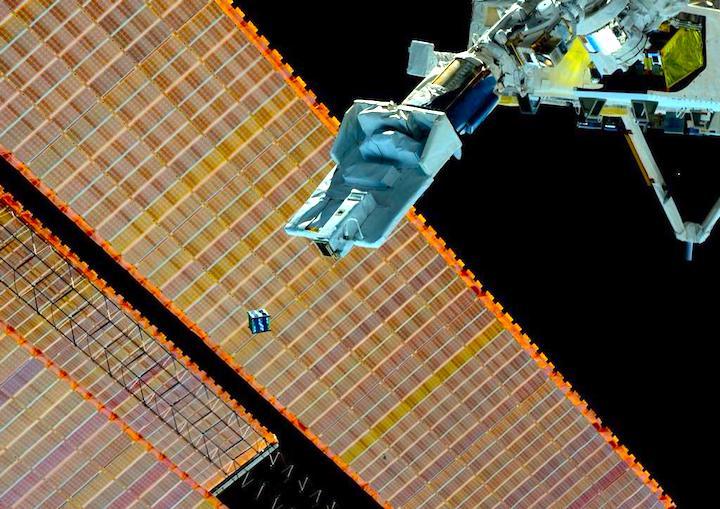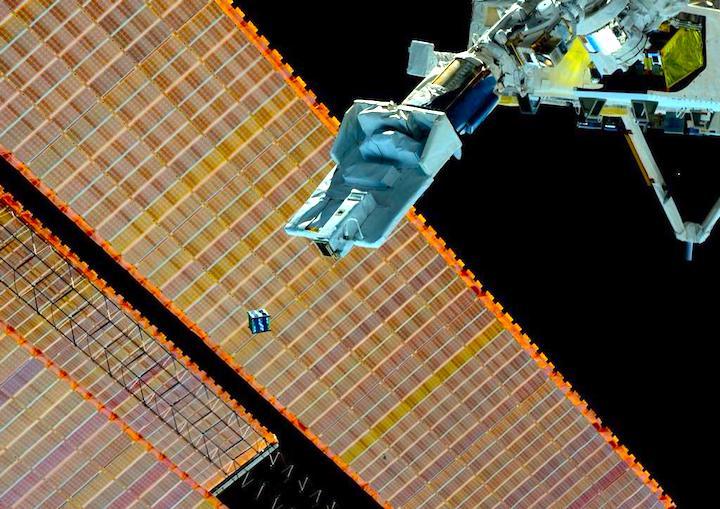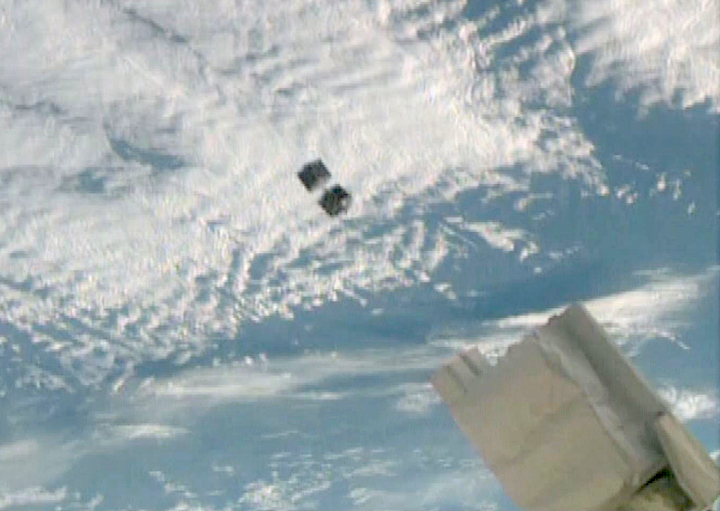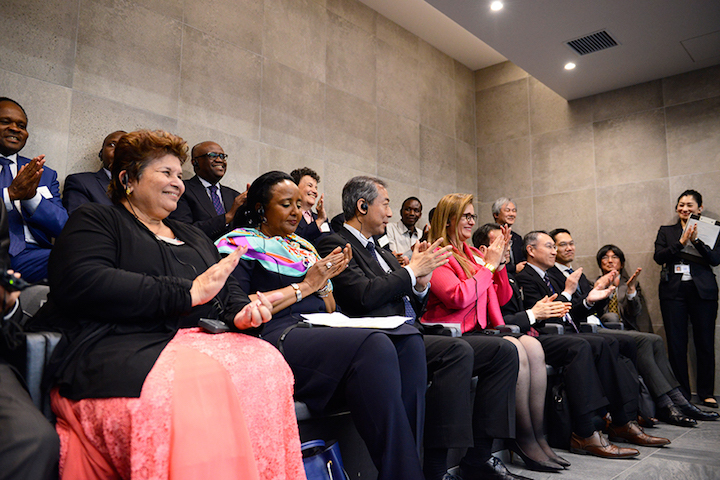13.05.2018

VIENNA, 11 May (United Nations Information Service) - The first cube satellite (CubeSat) developed under the KiboCUBE programme of the United Nations Office for Outer Space Affairs (UNOOSA) and Japan's Aerospace Exploration Agency (JAXA) has been deployed from the International Space Station (ISS). The deployment took place on 11 May 2018 from the Japanese Experiment Module (Kibo) of the ISS with the Kibo robotic arm.
The CubeSat, named "1KUNS-PF", or "First Kenyan University Nano Satellite-Precursor Flight", was developed by a team at the University of Nairobi after they were selected in 2016 by UNOOSA, in collaboration with JAXA, for the first round of the KiboCUBE programme. It is Kenya's first satellite, enabling Kenya to become a "space nation" with UNOOSA and JAXA's support. The University of Nairobi team intends to use its KiboCUBE CubeSat to test technologies it has developed for the future launch of a larger earth observation satellite. The team also hopes to apply data acquired from its CubeSat to the monitoring of agriculture and coastal areas.
"This first KiboCUBE satellite brilliantly represents our mission at the Office for Outer Space Affairs: bringing the benefits of space to everyone, everywhere. It is fantastic to see the team from the University of Nairobi build and employ space technology, and it is an important step for Kenya in developing its own skills, experience and infrastructure to access and enjoy the benefits of space. Congratulations to everyone involved in reaching this important milestone today. I also extend my continued appreciation to JAXA for their ongoing support to the KiboCUBE programme and to UNOOSA" said UNOOSA Director Simonetta Di Pippo.
"This is also an exciting step for UNOOSA as it is the first time that space hardware has been deployed as part of our capacity-building activities," added Ms Di Pippo.
"Congratulations on the deployment of the first satellite of Kenya from the Japanese Experiment Module "Kibo". I hope this successful first step of satellite deployment as technology demonstration will lead to the next stage of satellite missions from Kenya," said JAXA ISS Program Manager Koichi Wakata.
"The CubeSat 1 KUNS-PF of the University of Nairobi, which was deployed today, is the first KiboCUBE jointly selected by UNOOSA and JAXA. I would like to express my sincere gratitude to UNOOSA for their tireless effort in preparing for this joint mission, and I look forward to further extending the cooperation between the two organizations. I am proud that we are contributing to Kenya's emerging space technology through the CubeSat deployment mission utilizing the unique capability of the Japanese Experiment Module "Kibo" on the International Space Station," added Mr Wakata.
"The University of Nairobi has completed the development of 1KUNS-PF satellite and it was successfully deployed from the JAXA Kibo Module of ISS. This achievement is an important milestone for the University of Nairobi and Kenya, and it is our vision that it will create new opportunities for the University of Nairobi and Kenya to participate in space science. We are grateful for the support provided by international partners and the Government of Kenya during this mission, and we hope that this will continue in the future so that we can build the capacity for Kenyans to benefit and build more satellites," said Vice Chancellor of the University of Nairobi Professor Peter Mbithi.
The KiboCUBE programme was launched in 2015 as a capacity-building initiative by UNOOSA and JAXA to offer educational and research institutions from developing countries the opportunity to deploy CubeSats from the Kibo module of the ISS. After the selection of the team from the University of Nairobi for the first round, a team from the Universidad del Valle de Guatemala was selected for the second round, and they are currently developing their satellite. Applications for the third round of KiboCUBE closed on 31 March 2018 and the selection process is currently underway.
Quelle: United Nations Office for Outer Space Affairs
+++
The United Nations/Japan Cooperation Programme on CubeSat Deployment from the International Space Station (ISS) Japanese Experiment Module (Kibo) "KiboCUBE"

The United Nations Office for Outer Space Affairs (UNOOSA) and the Japan Aerospace Exploration Agency (JAXA) are pleased to announce the United Nations/Japan Cooperation Programme on CubeSat Deployment from the International Space Station (ISS) Japanese Experiment Module (Kibo) "KiboCUBE".
KiboCUBE is the dedicated collaboration between UNOOSA and JAXA in utilizing the ISS Kibo for the world. KiboCUBE aims to provide educational or research institutions from developing countries of United Nations membership with opportunities to deploy, from the ISS Kibo, cube satellites (CubeSats) which they develop and manufacture.
Currently, the only way to deploy CubeSats from the ISS is from Kibo. Kibo's unique capability is comprised of an airlock system and a robotic arm. The first orbital deployment of CubeSats from Kibo was successfully conducted in October 2012 through the Small Satellite Orbital Deployer developed by JAXA. Since then, nano-satellites and CubeSats from various countries around the world have been deployed from Kibo.
The deployment of CubeSats from ISS is easier than the direct deployment by a launch vehicle thanks to the lower vibration environment during launch. With this comparatively less demanding interface requirements, UNOOSA and JAXA believe that KiboCUBE will lower the threshold of space activities and will contribute to build national capacity in spacecraft engineering, design and construction.
Quelle: JAXA, United Nations Office for Outer Space Affairs
---
Update: 16.05.2018
.
Successful Deployment of First Kenyan Satellite,
selected as First KiboCUBE programme of UNOOSA and JAXA
Japan Aerospace Exploration Agency (JAXA)
United Nations Office for Outer Space Affairs (UNOOSA)
On May 11, 2018, the first CubeSat developed under the KiboCUBE programme has been successfully deployed from the Japanese Experiment Module “Kibo” of the International Space Station. This CubeSat, named “1KUNS-PF” was developed by a team from the University of Nairobi. On the day of the deployment, H.E. Dr. Amina C. Mohamed (the Cabinet Secretary for Ministry of Education in Kenya), H.E. Mr. Solomon K. Maina (the Ambassador Extraordinary and Plenipotentiary for Embassy of the Republic of Kenya), Dr. Vijoo Rattansi (Chancellor for the University of Nairobi), representatives from the University of Nairobi and the Japanese government watched the deployment of the CubeSat from the “Kibo” Mission Control Room in Tsukuba Space Center.
1KUNS-PF was developed as Kenya's first satellite, and the University of Nairobi will operate the CubeSat after its deployment from "Kibo". The experience and technology acquired from the development of this CubeSat will be applied in future earth observation satellite of Kenya.
KiboCUBE is a cooperative programme between UNOOSA and JAXA to offer opportunity to deploy CubeSats from "Kibo". This programme aims to improve space technology of the developing and emerging space nations of the United Nations member states. The third round of application was closed this March, and UNOOSA and JAXA are under the selection process. The result of the third round of application will be announced this summer timeframe.
Schedule of 1KUNS-PF (1st Kenyan University Nano Satellite-Precursor Flight)
- August, 2016: Selected as first round of KiboCUBE
- January 16th, 2018: Handover to JAXA
- April 2nd, 2018: Launch to the ISS
- May 11th, 2018: Deployment from "Kibo" using JEM robotic arm

Photo of deployment of 1KUNS-PF(Kenya) and Irazu (Costa Rica) (deployed at the same time)

Photo of Kibo Mission Control Room
Comments
Koichi Wakata, Director General, JAXA Human Spaceflight JAXA
Congratulations on the successful deployment of the first satellite of the Republic of Kenya from the Japanese Experiment Module "Kibo"! I hope this successful first step of satellite deployment as technology demonstration will lead to the next stage of satellite missions from the Republic of Kenya. The CubeSat (1 KUNS-PF) of the University of Nairobi of the Republic of Kenya which was deployed today is the first KiboCUBE jointly selected by the United Nations Office for Outer Space Affairs (UNOOSA) and JAXA. I would like to express my sincere gratitude to UNOOSA for their tireless effort in preparing for this joint mission, and I look forward to further extending the cooperation between the two organizations. I am proud that we are contributing to Kenya's emerging space technology through the CubeSat deployment mission utilizing the unique capability of the Japanese Experiment Module "Kibo" on the International Space Station.
Simonetta Di Pippo, UNOOSA Director
This first KiboCUBE satellite brilliantly represents our mission at the Office for Outer Space Affairs: bringing the benefits of space to everyone, everywhere. It is fantastic to see the team from the University of Nairobi build and employ space technology, and it is an important step for Kenya in developing its own skills, experience and infrastructure to access and enjoy the benefits of space. Congratulations to everyone involved in reaching this important milestone today. I also extend my continued appreciation to JAXA for their ongoing support to the KiboCUBE programme and to UNOOSA.
This is also an important day for UNOOSA as it is the first time that space hardware has been deployed as part of our capacity-building activities. It is an exciting step for us in the development of our efforts to bring access to space to all of humankind.
Prof. Peter Mbithi, Vice Chancellor of University of Nairobi
The University of Nairobi have completed the development of 1KUNS-PF satellite and it was successfully deployed from the JAXA Kibo Module of ISS. This achievement is an important milestone for University of Nairobi and Kenya, and it is our vision that it will create new opportunities for the University of Nairobi and Kenya to participate in space science. We are grateful for the support provided by international partners and the Government of Kenya during this mission, and we hope that this will continue in the future so that we can build the capacity for Kenyans to benefit and build more satellites.
Quelle: JAXA
